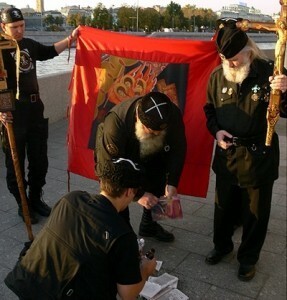Patriarchy Riot
Peter Pomerantsev
The Russian Orthodox Church is on holy war footing. The ‘sacrilege’ of Pussy Riot is no isolated incident, Patriarch Kirill says, but part of a wave of attacks on the church, ranging from accusations of financial irregularity to seemingly random acts of vandalism against church property. The attack on the church is not just anti-religious, according to pro-Kremlin media, but part of a larger geopolitical campaign by America to destabilise Russia.
‘With the failure of the protest movement… the target has now moved to the Russian Orthodox Church,’ says Komsomolskaya Pravda, the country’s largest daily. Pussy Riot are instruments in the hands of Russia’s enemies, the paper speculates, and the US State Department’s support for LGBT rights a ruse to break down Russia’s defences. The geopolitical battle is in turn part of a much greater spiritual and civilisational war. Pussy Riot ‘has helped clarify matters’, Archpriest Dmitri Smirnov says. ‘Any Russian now understands what force really stands behind feminism and punk, put together they are obviously demonic manifestations.’
‘Liberal society,’ Patriarch Kirill says, ‘will lead to legal chaos and then the apocalypse.’ Once again Russia is the ‘Third Rome’, the title bestowed on it during the reign of Ivan IV, the bastion of Orthodoxy facing up to a west engulfed by liberalism. ‘We tell the world: you cannot destroy the church,’ the patriarch said in a recent TV interview. This is true: from near extinction in the USSR, the Orthodox Church has grown into one of the wealthiest and most powerful organisations in post-Communist Russia.
‘Autocracy, orthodoxy, nationhood’ was the rallying cry of tsarist Russia, uniting political and religious power. Though murderously repressed in the first decades of the USSR, the Orthodox Church returned to a limited role during the Great Patriotic War: Stalin, who started life as seminary student, understood its potential to unite the country in crisis. Until 1989 the church was allowed to exist under strict state supervision. Archives opened in the early 1990s indicated that KGB infiltration was rife, with private confessions to priests regularly passed on to the secret services. Both the current patriarch and his predecessor have been accused of acting as KGB agents. The archives were quickly closed again.
Throughout the 1990s the Church rebuilt its power. It was embroiled in a series of financial scandals, including one related to importing tax-free cigarettes as ‘humanitarian aid’. In 2001 researchers at Bremen University estimated the Church’s income at $500 million: business interests included hotels, banks and importing BMWs. Since then the Church’s accounts have become secret, but its estimated wealth has increased many times with support from semi-state energy giants like Gazprom. A law has been passed promising to give back all the property the Church owned before 1917, which will potentially make it the largest landowner in the country. It has 150 million followers worldwide; 90 per cent of ethnic Russians now call themselves Orthodox.
This year, Patriarch Kirill’s personal wealth has come under scrutiny too. First came the mysterious tale of the ‘disappearing watch’. A photo showed him sitting at a table bare-wristed, but his reflection in the shiny table clearly showed him wearing a Breguet watch worth at least $30,000. Embarrassed by this incident, the patriarch had to confront the even odder case of the ‘nano-dust’. His penthouse in Moscow was allegedly damaged by building work in a next-door flat. Courts ruled that the neighbour needed to pay him $677,000. According to the prosecution, dust from the building work, which had spread to the patriarch’s property, contained mysterious carcinogenic ‘nano-particles’. The media accused the patriarch of using the ‘nano-dust’ as a pretext to take away his neighbour’s property. There was a public outcry, but the ruling was not overturned.
Politically, the Church has returned to something like its old tsarist role as the Kremlin’s bosom partner. Putin’s rule is ‘a miracle from God’, the patriarch said in March, and he has advised his flock to vote for the president. When some liberal-minded clerics expressed support for the protest movement, arguing it was part of a moral battle against corruption, the church’s hierarchy was quick to back the Kremlin. ‘The first revolutionary was Satan,’ Archpriest Smirnov said. The Church has a militant arm full of burly, leather-clad activists with a penchant for burning ‘unpatriotic’ and 'sacrilegious' novels (including Harry Potter) and attacking gay rights marches. There are also Orthodox Hells Angels who staged a Harley Davidson ride through Moscow as a response to Pussy Riot’s punk prayer in the Cathedral of Christ the Saviour.
The cathedral, demolished by the Bolsheviks in 1931 and rebuilt in 2000, is the most potent symbol of the Church’s return. A Consumer Rights NGO has accused the Church of only using 7 per cent of the cathedral for religious purposes: halls are rented out for private parties and corporate events; in the basement there is a car-wash, car repair shop and car-park. The courts have said that it isn't commercial activity but ‘gratuitous mutual gift-making for a recommended price’. On 22 April, believers gathered outside the cathedral for a special service in defence of the faith. The church claims as many as 65,000 turned up; some independent observers put the figure closer to 20,000. Icons which had been damaged by the Bolsheviks were paraded in front of the crowd, as a reminder of the Church’s trials past and present. ‘We have gathered to pray to God for our country,’ the patriarch said, ‘so that our history is never lied about and our spirit never perverted.’

Comments